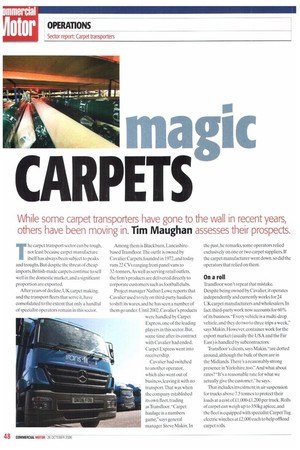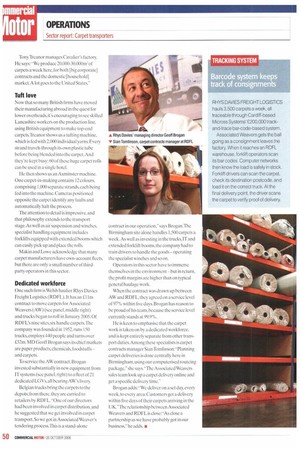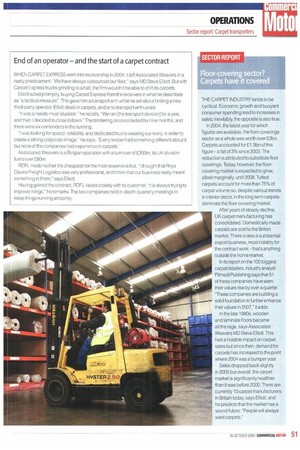magic CARPETS
Page 48

Page 50

Page 51

If you've noticed an error in this article please click here to report it so we can fix it.
While some carpet transporters have gone to the wall in recent years, others have been moving in. Tim Maughan assesses their prospects.
The carpet transport sector can be tough, not least because carpet manufacture itself has always been subject to peaks and troughs.But despite the threat of cheap imports, British-made carpets continue to sell well in the domestic market, and a significant proportion are exported.
After years of decline. UK carpet making, and the transport fleets that serve it, have consolidated to the extent that only a handful of specialist operators remain in this sector. Among them is Blackburn, Lancashirebased Transfloor.The outfit is owned by Cavalier Carpets, founded in 1972, and today runs 22 CVs ranging from panel vans to 32-tonners.As well as serving retail outlet& the firm's products are delivered directly to corporate customers such as football clubs.
Project manager Nathan Lowe reports that Cavalier used to rely on third-party hauliers to shift its wares, and he has seen a number of them go under Until 2002. Cavalier's products were handled by Carpet Express, one of the leading players in this sector. But, some time after its contract with Cavalier had ended. Carpet Express went into receivership.
Cavalier had switched to another operator. which also went out of business, leaving it with no transport.That was when the company established its own fleet, trading as Transiloor."Carpet haulage is a numbers game," says general manager Steve Makin. In the past, he remarks, some operators relied exclusively on one or two carpet suppliers.If the carpet manufacturer went down, so did the operators that relied on them.
On a roll
Transfloor won't repeat that mistake. Despite being owned by Cavalier, it operates independently and currently works for 24 UK carpet manufacturers and wholesalers In fact, third-party work now accounts for 60% of its business. "Every vehicle is a multi-drop vehicle, and they do two to three trips a week," says Makin. However, container work for the export market (usually the USA and the Far East) is handled by subcontractors.
Transfloor's clients.. says Makin,"are dotted around, although the bulk of them are in the Midlands. There's a reasonably strong presence in Yorkshire, too."And what about rates? "It's a reasonable rate for what we actually give the customer," he says.
That includes investment in air suspension for trucks above 7.5 tonnes to protect their loads at a cost of £1,00041,200 per truck. Rolls of carpet can weigh up to 350kg apiece, and the fleet is equipped with specialist Carpet Tug electric winches at £2,000 each to help offload carpet rolls. Tony Treanor manages Cavalier's factory. He says: "We produce 20,000-30,000m' of carpets a week here, for both [big corporate] contracts and the domestic [household] market.A lot goes to the United States."
Tuft love
Now that so many British firms have moved their manufacturing abroad in the quest for lower overheads, it's encouraging to see skilled Lancashire workers on the production line, using British equipment to make top-end carpets.Treanor shows us a tufting machine, which is fed with 2,000 individual yarns. Ever.t., strand travels through its own plastic tube before being blended into the carpet. And they're kept busy: 60 of these huge carpet rolls can be used in a single hotel.
He then shows us an Axminster machine. One carpet-in-making contains 12 colours, comprising 1,000 separate strands, each being fed into the machine. Cameras positioned opposite the carpet identify any faults and automatically halt the process.
The attention to detail is impressive, and that philosophy extends to the transport stage. As well as air suspension and winches, specialist handling equipment includes forklifts equipped with extended booms which can easily pick up and place the rolls.
Makin and Lowe acknowledge that many carpet manufacturers have own-account fleets, but there are only a small number of thirdparty operators in this sector.
Dedicated workforce
One such firm is Welsh haulier Rhys Davies Freight Logistics (RDFL). It has an lm contract to move carpets for Associated Weavers (AW) (see panel, middle right) and trucks began to roll in January 2005, Of RDFL's nine sites, six handle carpets. The company was founded in 1952, runs 150 trucks, employs 440 people and turns over £32m. MD Geoff Brogan says its chief markets are paper products, chemicals, foodstuffs and carpets.
To service the AW contract. Brogan invested substantially in new equipment from IT systems (see panel, right) to a fleet of 21 dedicated LG Vs, all bearing AW's livery.
Belgian trucks bring the carpets to the depots: from there, they are carried to retailers by RDFL."One of our directors had been involved in carpet distribution, and he suggested that we get involved in carpet transport. So we got in Associated Weaver's tendering process.This is a stand-alone contract in our operation," says Brogan.The Birmingham site alone handles 1,500 carpets a week. As well as investing in the trucks, TT and extended forklift booms, the company had to train drivers to handle the goods-operating the specialist winches and so on.
Operators in this sector have to immerse themselves in the environment -hut in return. the profit margins are higher than on typical general haulage work.
When the contract was drawn up between AW and RDFL, they agreed on a service level of 97% within live days. Brogan has reason to be proud of his team, because the service level currently stands at 99.9%.
He is keen to emphasise that the carpet work is taken on by a dedicated workforce, and is kept entirely separate from other transport duties. Among these specialists is carpet contracts manager Sian Tomlinson:"Plarming carpet deliveries is done centrally here in Birmingham, using our computerised routeing package," she says. "The Associated Weavers sales team look up a carpet delivery online and get a specific delivery time."
Brogan adds:-We deliver on a set day, every week, to every area. Customers get a delivery within five days of their carpets arriving in the LIK."The relationship between Associated Weavers and RDFL is close: "As close a partnership as we have probably got in our business," he adds. mi
111:10,11MtEik.sliVil
RHYS DAVIES FREIGHT LOGISTICS hauls 3,500 carpets a week, all traceable through Cardiff-based Micross Systems' 2200,000 trackand-trace bar-code-based system.
Associated Weavers gets the ball going as a consignment eaves the factory. When it reaches an iRDFL warehouse, forklift operators scan its bar codes. Computer networks then know the load is safely in stock. Forklift drivers can scan the carpet, check its destination postcode, and load it on the correct truck. At the final delivery point, the drIver scans the carpet to verify proof of delivery.
End of an operator — and the start of a carpet contract
WHEN CARPET EXPRESS went Into receivership in 2004, I left Associated Weavers in a nasty predicament. "We have always outsourced our fleet," says MD Steve Elliott. But with Carpet Express trucks grinding to a halt, the firm wouldn't be able to shift its carpets.
Elliott acted promptly, buying Carpet Express from the receivers in what he describes as "a tactical measure". This gave him a transport arm while he set about finding a new third-party operator. Elliott deals in carpets, and is no transport enthusiast "It was a needs-must situation," he recalls. "We ran [the transport division] for a year, and then I decided to close it down." The tendering process lasted for nine months, and there were six contenders in the running.
"I was looking for speed, reliability, and dedicated trucks wearing our livery, in order to create a strong corporate image,' he says. "Every tender had something different about it, but none of the companies had experience in carpets."
Associated Weavers is a Belgian operation with a turnover of £200m; its UK division turns over £80m.
RDFL made neither the cheapest nor the most expensive bid. "I thought that Rhys Davies Freight Logistics was very professional, and I think that our business really meant something to them," says Elliott, Having gained the contract, R DEL liaises closely with its customer. "It is always trying to improve things," he remarks, The two companies hold in-depth quarterly meetings to keep things running smoothly.
SECTOR REPORT
Floor-covering sector? Carpets have It covered
THE CARPET INDUSTRY tends to be cyclical. Economic growth and buoyant consumer spending lead to increases in sales; inevitably, the opposite is also true.
In 2004, the latest year for which figures are available, the floor coverings sector as a whole was worth over C2bn. Carpets accounted for £1.3bn of this figure — a fail of 3% since 2003. The reduction is attributed to substitute floor coverings. Today, however, the floorcovering market is expected to grow, albeit marginally, until 2008. Tufted carpets account for more than 75% of carpet volume so, despite various trends in interior decor, in the long term carpets dominate the floor-covering market.
After years of steady decline, UK carpet manufacturing has consolidated. Domestically made carpets are sold to the British market. There is also a substantial export business, most notably for the contract work —that's anything outside the home market.
In its report on the 100 biggest carpet retailers, industry analyst Plimsoll Publishing says that 51 of these companies have seen their values rise by over a quarter. "These companies are building a solid foundation to further enhance their values in 2007," it adds.
In the late 1990s, wooden and laminate floors became all the rage, says Associated Weavers MD Steve Elliott. This had a notable impact on carpet sales but since then, demand for carpets has increased to the point where 2004 was a bumper year.
Sales dropped back slightly in 2005 but overall, the carpet market is significantly healthier than it was before 2000. There are currently 10 carpet manufacturers in Britain today, says Elliott, and he predicts that the market has a sound future: "People will always want carpets."
























































































































































































